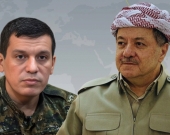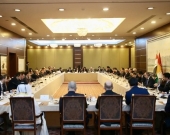Kurdish Language Education Faces Obstacles in Kirkuk

“First, our curriculum is from the Kurdistan Regional Government (KRG) but our tests are supervised by Baghdad,” Kaka explained. “Secondly, Kurdish students from Kirkuk don't get admission into Kurdistan universities,” he said.
Kaka told Rudaw that that 35 people had been appointed by the KRG to deal with 500 Kurdish schools in Kirkuk this year.
Under Saddam Hussein the Kurdish language was banned in Kirkuk, as part of the Iraqi dictator’s effort to change the demography of the oil-rich province in favor of Arabs. Kurdish education was restarted in Kirkuk after Saddam was ousted in the 2003 US-led invasion.
“If the KRG does not help, Kurdish education (in Kirkuk) will fail for sure,” said Sabah Omar, an education official in the province. “We can't depend on Baghdad at all; we lack books, desks and staff and all schools have two or three shifts,” he added.
Energy-rich and multiethnic Kirkuk in northern Iraq, as well as parts of Diyala and Mosul, are regarded by the Kurds as historic and cultural parts of Kurdistan. But they are also claimed by the Arab central government in Baghdad as inseparable parts of Iraq.
Article 140 of the Iraqi constitution stipulates that demographic changes made in the province by Saddam’s regime have to be reversed before the people themselves decide in a referendum if they want to stay with Iraq or be attached to the autonomous Kurdistan Region.
In the meantime, Kurdish language education officials demand that the KRG assist Kurdish education due to Baghdad’s unwillingness to help the program.
According to Kaka, the Iraqi Ministry of Education in Baghdad has employed many people in the Arab regions of Kirkuk such as Hawija, Ryadh and Abasia, but none for Kurdish language education.
He also criticized Baghdad for employing people without the provincial Education Directorate’s consent. “We want all employment to be done through the directorate of the education in Kirkuk,” he said.
Kaka said that 100 people were finally employed for Kurdish education, which was done through the Kirkuk’s Kurdish governor, Najmaldin Karim.
Sources tell Rudaw that a new school building for Kurdish education has remained closed because the ruling Kurdistan Democratic Party (KDP) and Patriotic Union of Kurdistan (PUK) cannot agree on who will run the facility.
The education official admitted to some political interference here and there, but denied that KDP-PUK rivalry has impacted Kurdish education in Kirkuk.
RUDAW












